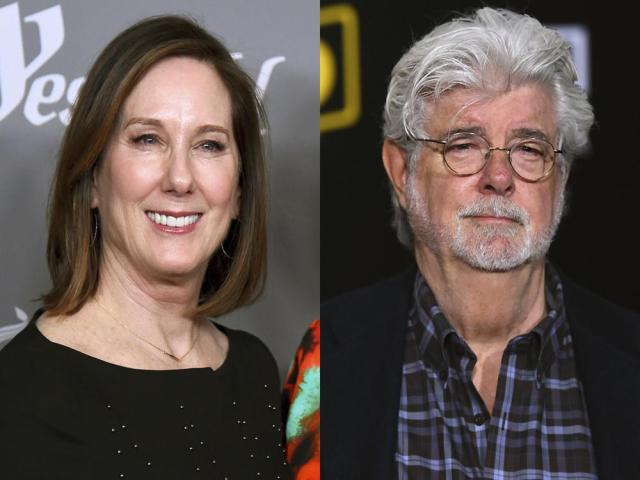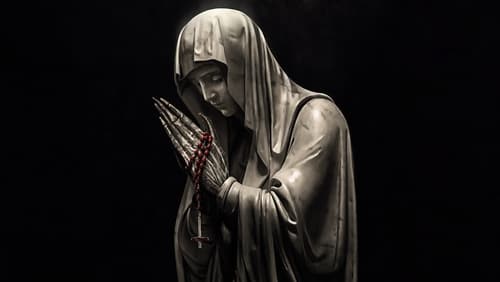George Lucas, Kathleen Kennedy honored by Producer’s Guild

George Lucas and Kathleen Kennedy, stewards of the Star Wars universe and numerous other notable motion pictures, are being honored by the Producers Guild of America for their contributions to the film industry. The PGA said Friday that Lucas and Kennedy will receive the Milestone Award at the Producers Guild Awards in March, joining the ranks of previous honorees that include Louis B. Mayer, Walt Disney and Steven Spielberg.
Lucas, in a statement, said the award is a celebration of all that goes into bringing stories to life: “Protecting creativity while balancing business, moving technology forward to make real what you can see in your mind’s eye and doing it all from scratch most of the time.”
Lucas, in addition to films he’s directed from “American Graffiti” to “Star Wars,” has produced and executive produced for the likes of Spielberg, Francis Ford Coppola and Akira Kurosawa all while building the Lucasfilm empire, including Industrial Light & Magic and Skywalker Sound.
“Being recognized alongside my longtime friend and fellow producer Kathleen Kennedy makes this honoring of our shared and individual works even more meaningful,” Lucas continued.
He and Kennedy shared friends and collaborators and both worked on “Indiana Jones and the Temple of Doom,” her through the production company she co-founded with Spielberg and Frank Marshall, Amblin Entertainment. Kennedy’s credits include “E.T. The Extra Terrestrial,” “Schindler’s List,” “Jurassic Park” and the “Back to the Future” films. In 2012 she became co-chair of Lucasfilm with Lucas. A few months later, when the company was acquired by Disney, Lucas stepped aside and Kennedy became president, where she has produced the newest Star Wars trilogy and various spinoffs.
“I am very honored to share this award with George Lucas who has inspired a generation of filmmakers who were coming of age, not only through his storytelling but through technological innovation that unlocked our imagination,” Kennedy said in a statement.
Producers Guild of America presidents, Gail Berman and Lucy Fisher, added in a joint statement that Lucas and Kennedy have, “carved out a fantastic empire of entertainment that inspires and entertains billions, all with the highest levels of both creative and technical achievement.
“What George has built through his movies and through Lucasfilm has enriched every facet of filmmaking, and his colossal creativity and technical genius amazed the world. Kathleen has ascended to the highest levels of our industry, facing ever-changing challenges each time she succeeded in producing one of the brilliant and boundary breaking films she is known for. And since joining Lucasfilm as president, she has expertly exalted its IP to be even more influential and treasured around the world...We’re very proud to honor George and Kathleen as they celebrate the 50th anniversary of Lucasfilm.”
The pandemic-era saga of tennis star Novak Djokovic in Australia this week is but one of many: Pro athletes who have refused to be vaccinated have been put at center court in a larger contest — as famous faces who are becoming proxy players in the accelerating worldwide cultural battles over COVID jabs.
The NBA’s Kyrie Irving missed the first months of the Brooklyn Nets’ season before making a partial return. The NFL’s Aaron Rodgers went from revered veteran to polarizing figure. And we’re still not finished with the diplomatic standoff and fallout over Djokovic’s exemption to play in the Australian Open.
It’s a cultural issue, not a question of numbers. The vast majority of players in professional sports organizations are vaccinated — more than the U.S. population at large — and tacitly or explicitly accept the evidence of their safety and efficacy. But the handful of high-profile objectors represent a new front in what one expert calls the “oversized role of sports” in society’s conversations.
“We look to sports to give us an answer or clarify issues in the larger culture,” says Robert T. Hayashi, an associate professor of American studies at Amherst College in Massachusetts whose specialties include the history of sports. ”Many times, the most detailed conversations we see arising in the culture and the media are regarding sports.”
Their centrality is not necessarily because they are exceptional, but because they serve as avatars for all of us.
“They are all different individuals. They have different approaches,” says Dan Lebowitz, executive director of the Center for the Study of Sport in Society at Northeastern University. “Athletes,” he says, “are no different than really the whole of humanity.”
And in that sense, they are subject to the same information and misinformation — the same receptiveness or stubbornness — as the rest of the population.
“We live in a world where we’ve moved really far away from a central set of facts,” Lebowitz says. “None of these athletes are impervious to all the information that’s coming at them around the world, or impervious to the divisions that we have.”
While figures like Irving, Rodgers and Djokovic are at the center of the conversation, they may not actually be driving it. COVID vaccines, in their brief existence, have been fast-tracked into an elite group of divisive political and cultural issues — things about which people tend to pick a side and stick to it no matter what.
Mark Harvey, a professor at the University of Saint Mary in Kansas and author of “Celebrity Influence: Politics, Persuasion, and Issue-based Advocacy,” says these are the topics on which famous people may actually have the least sway.
“The kind of issues where they aren’t really influential are the traditional wedge issues,” Harvey says. “Celebrities aren’t really going to change anyone’s minds on abortion or guns. For most people, this has become part of what has become a wedge issue.”
Well-known voices then become something else — amplification devices, opinions used more as fodder for existing arguments than as actual agents of influence.
“People that have certain beliefs that they want to promulgate forward ... they’re going to grab on to these athletes as spokespersons for their cause,” Lebowitz says.
That doesn’t necessarily mean that famous voices have no actual effect, though. Harvey says a celebrity’s personal connection to an issue can matter — and can command attention.
For example: “Today” show host Katie Couric got a colonoscopy on the air in 2000 after her husband died from colon cancer, and the number of such procedures saw a major spike in the months that followed. And Elton John talking to LGBTQ communities — especially about LGBTQ issues — might find himself heard more than someone else.
By the same logic, devoted fans of a team like the Green Bay Packers might be more likely to listen to vaccination opinions from a storied local player like Rodgers. And the opinions of Black athletes might grab more traction in African-American communities, especially when tapping into a history of medical mistreatment.
“They can feel a sort of lack of trust, with memories of the Tuskegee experiments and forced sterilization for women of color,” Hayashi says. “Those identities are not stripped away in these situations.”
The stance of Djokovic might similarly resonate in the Serbian athlete’s home country, given its role in European conflicts of the 20th century.
“For Djokovic, the Serbian community with their role in Europe and how they’ve been presented as bad guys, he can become a symbol for some certainly by asserting a sort of national pride with the way he’s standing up,” Hayashi says.
While sports have always been indivisible from politics and public conflicts, there has been a major ground shift in the years since Michael Jordan made public neutrality on all non-sports issues an essential part of his brand. Today there is almost an expectation of advocacy, especially with the precedent set by Colin Kaepernick’s protests and the embrace by many athletes of the Black Lives Matter cause.
“We expect an awful lot of them,” Leibowitz says. “We ask them to fix hate and hurt. And now we expect a groundswell from them on public health.”
These expectations were heightened through the cultural crucible of the Trump era, which Harvey says were “defined by celebrity advocacy” under a president who himself — as businessman, reality-TV star and general high-profile person — helped build the notion of celebrity voice into an American bully pulpit in the 1980s, 1990s and 2000s.
“I think the moral of the story that celebrities are learning, which is where you kind of have to take a side,” Harvey says. “Nowadays, if you don’t take a side, people don’t think you don’t have a spine.”
And while athletes don’t necessarily feel the pressure they once might have to constantly think of the children they’re influencing, the expectation that they remain role models for the young remains embedded in the culture — as it has since the years of the earliest sports mega-celebrities like Babe Ruth more than a century ago.

100+ Marathi Actress list with photos
- list of 100+ marathi actress with there photos, name date of birth and there movies and drama list

2 Best Movie Horror Recomendation (2021) It really scares us
- Blockbuster films such as The Huntsman: Winters War (Cedric Nicolas-Troyan, The name David Tennant will certainly never be separated from his involvement

Spider-Man: No Way Home Still Giving Much to Talk About Marvel Movie
- Spider-Man: No Way Home Talk About Marvel Movie commented in a recent interview the famous Tom Holland

Priyanka Chopra rumoured to be one of Meghan Markles bridesmaids
- Priyanka Chopra is refusing to confirm reports shell be a big part of pal Meghan Markles royal wedding in May.